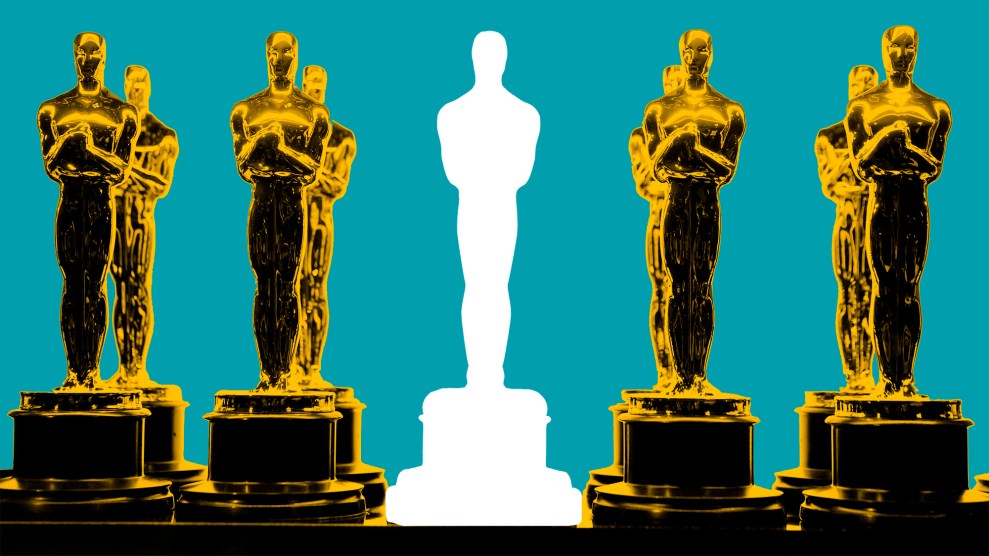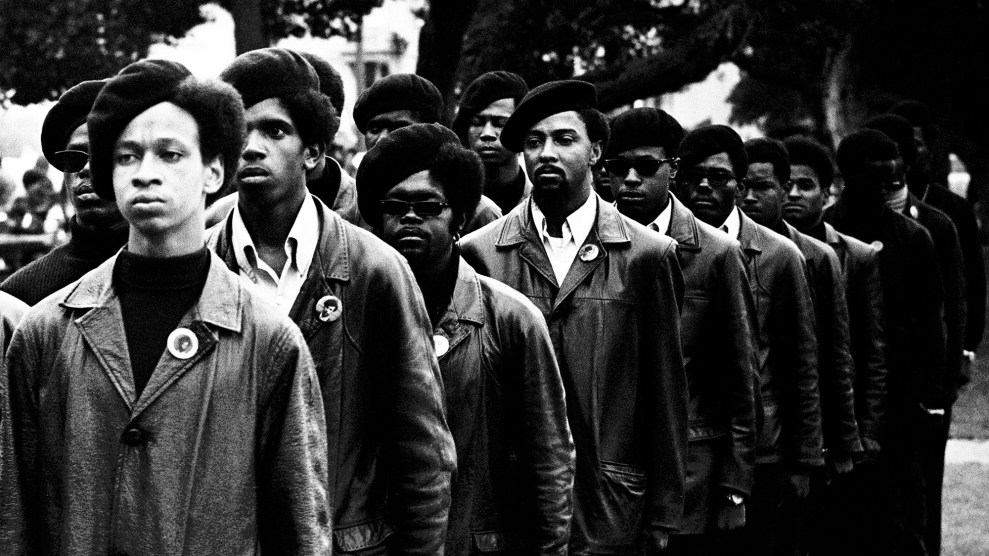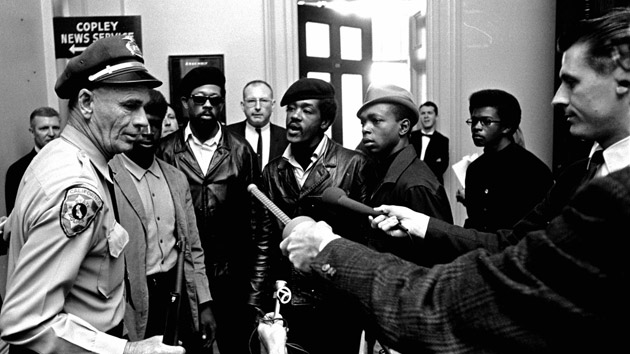
Keith and Kenny Lucas, co-screenwriters of "Judas and the Black Messiah."Desiree Navarro/WireImage/Getty
In Judas and the Black Messiah, the life of Black Panther leader Fred Hampton, a revolutionary socialist who was committed to civil rights, is portrayed in an honest and complete way. That alone is a notable and somewhat unexpected achievement for a relatively big budget, big distribution (Warner Brothers) film.
It’s also a notable and somewhat unexpected achievement for Keith and Kenny Lucas, who, along with director Shaka King and co-writer Will Berson, wrote the semi-biopic’s Academy Award–nominated screenplay. The Hollywood honor for the 35-year-old identical twins arrives after they built careers in comedy, including standup, appearances in 22 Jump Street and Arrested Development, and starring roles in the series Friends of the People and Lucas Bros. Moving Co.
The Lucas brothers stumbled onto Hampton’s story when they were still in school, and someday vowed to retell it. At the time, Kenny was dabbling in Marxism. Both brothers still cite Hegel, a German philosopher whose historical theories were an antecedent for Karl Marx, as an intellectual influence. I spoke with them in May (an edited version of our conversation is below) after the film notched five Oscar nominations, including one for best picture—a historic haul for a movie made by an all Black team of producers. At the Academy Awards presentation in late April, the film won Oscars for best original song, in recognition of H.E.R.’s “Fight for You,” and for best supporting actor, honoring Daniel Kaluuya’s performance as Hampton.
Even in the midst of a lengthy media tour, they seemed unexhausted and upbeat, about both the movie’s reception and renewed prospects for racial justice. In some ways, the United States has regressed since Hampton’s time, but the Lucas brothers seemed hopeful that the Black Lives Matter protests of the past year have built a foundation that can eventually amount to something that would belatedly fulfill Hampton’s vision.
Mother Jones: How did you guys come to want to do a sort of biopic on Fred Hampton? You guys have been kind of kicking around this idea for years?
Kenny Lucas: Yeah, we had been. We had just got into the industry, I think in 2010. And then right around 2012 or 2013 we started to formulate the idea. We didn’t start to officially pitch it until late 2013, early 2014.
We came across Fred and his story in college. And it was, of course, a very tragic story, but one that we’ve always sort of just remembered. So when we got into the industry one of our stated goals was to get the movie made just because we really wanted to help cement his legacy as a civil rights leader.
Keith Lucas: More like, secure his legacy. I think it’s unfair to history that he’s not more widely known. Because of his message and his ideas and his beliefs and what he was striving for, I think that it’s just a worthy message to know. So it felt like it was imperative to get a film like this made.
MJ: Did you worry that highlighting him accurately might backfire? The idea of someone being an avowed socialist stresses a lot of people out, especially people who lived through the Cold War.
Kenny: Yeah, there’s always the potential for people to react negatively to the portrayal of a socialist, America has this sort of allergic reaction to anything that is socialist. But I felt like Fred’s personality, his story, his demeanor, his message, while certainly influenced and infused with Marx’s ideology, I felt like it hinted at a universal message that could connect to anyone across political ideologies. So I was never too concerned, because I was very confident that people would just love Fred. And they did.
Keith: We use his actual speeches. You can’t dilute his message if you’re using his words. As Kenny pointed out, once you find out about Fred, you fall in love with Fred, and you appreciate his message, irrespective of your political ideology—now, at least, though it certainly wasn’t like that in the 60s.
MJ: I think the movie is convincing in that regard. He’s a sympathetic, inspiring figure. On a logistical level, did you guys get pushback on being very open about his politics? Was there any point where they were like, “No,” or people were like, “Hey, maybe let’s sanitize this?”
Kenny: I give Warner Brothers mad respect in this regard. They were never trying to make a sanitized message. If anything, I think they wanted us to be as factual as possible. So I never got the impression that they were trying to dilute Fred’s message. They were very supportive.
Keith: They gave us complete support. The fact that we went out and brought Mama Akua [Hampton’s partner] on and brought Chairman Fred Jr. [his son] on. We really, really tried to get it as authentic as we could, in a two-hour film.
MJ: To what degree was contemporaneous politics in your mind while making this? There has been, from some segments of the liberal political sphere, this valorizing of the FBI and the CIA and the Trump era, without mind to the history of these institutions that exist in Judas and The Black Messiah, and the precedent of things like COINTELPRO.
Kenny: When we were conceiving of the idea we were definitely thinking about the current political climate. It’s hard for me to say that the FBI is fundamentally distinct from how they operated in the 60s because there’re still serious institutional problems that I think date back to Hoover’s reign. I don’t think that they ever really did an inventory to correct those sort of systemic problems.
Keith: No, I don’t think they’ve ever had an honest confrontation of Hoover and the history of COINTELPRO. The fact that Hoover’s name is still on the FBI building… it’s a testament to the fact that we haven’t grappled with it.
MJ: Yeah, I think if you look at things like the FBI’s Black Identity Extremist designation, that, yeah, there’s a direct line to stuff like COINTELPRO.
Kenny: Right. And now they’re surveilling a lot of the activists in the Black Lives Matter movement, based on this black extremists category. Now they’ve discarded it, but I’m sure there’s some other way, there’s some other legal loophole they’re using to justify surveillance and violating the constitutional rights of activists who critique the state. They always have some excuse.
MJ: Do you worry that the through-line whatever persisted back then that is persisting now has a potential neutering effect on contemporary black radicalism and just radical politics in general?
Kenny: I think it necessarily has a neutering effect. The fear of being neutralized, either physically or psychologically, has to necessarily weigh on anyone who’s considering a career in activist politics. I mean, you’d be foolish not to think that.
MJ: Another thing I thought was really interesting in the movie was Hampton’s acute understanding of politics as a struggle for power. You guys literally have him paraphrase that Clausewitz line when he says “politics is war, by other means.” I don’t want to necessarily say that that’s been lost in an understanding of contemporary politics by a lot of people, but it kind of feels like it has. Are there ideological successors to Hampton moving around still, or do you think that neutering effect has kept that from happening?
Kenny: I think there’s been a decentralization of the black radical movement in general with Black Lives Matter where we don’t have figures like King or figures like X. We’ve decided to decentralize the movement to avoid assassinations. Tactically, I think that’s wise. You see less Hamptons and you see more of a collective will to get things done.
MJ: A lot of people would say they’re pessimistic after a summer of intense protests that did not amount to meaningful policy change. For the skeptical among us, what do people have to be hopeful for?
Kenny: Well, the George Floyd Act was passed. It’s a start in the right direction towards finally confronting the menace of policing in minority communities. Obviously, more needs to be done. I don’t think that when we started the protests, things were going to change immediately. We’re finally having the most honest conversation I think we’ve ever had about policing and minority communities. It’s going to be a dogfight, because police unions are powerful. The right-wing media ecosystem is very powerful. They have money, and they’re going to fight tooth and nail against our positions. We have to have the stamina and the will to go the distance. We can’t let apathy and nihilism and the idea that nothing can get done immediately sour our progress. We have to put our hands in the dirt, and we have to fight for legislation and fight for the things that we want to change. We have the momentum. We have to capitalize on it.
MJ: The nominations for the Academy Awards, the general critical reception—do you think that that opens the pathway for more of these kinds of movies? I don’t even know—like, a Huey Newton biopic or something like that?
Keith: I mean, you hope, right? You hope. I think that there’s been a ton of progress in black cinema over the last decade. We’ve seen some of the most inventive films come out that we’ve ever seen, from black creators. I’m generally optimistic that we can get more films like this made. With that said, it’s still going to be a dogfight. It’s always hard to get movies made. It’s especially hard to get movies made about black leaders that a lot of folks don’t necessarily understand why a movie should be made about them. I think that our film certainly opens up a few doors. And that’s all we can really do, is incremental change so that you can lead to a larger revolution. I think that that’s what we’re doing in Hollywood.
MJ: Do you ever worry about the sort of Hollywood commodification of these sorts of perspectives? On one hand, these are opportunities that you absolutely have to seize, but on an internal level, does that bother you?
Kenny: As a stand-up comedian you tend to have more control over your material and your art than other branches of the industry. So when you dabble in film, you sort of say to yourself that you’re making a concession where part of the process is commodification. Even in standup, you’re selling something and you want to be paid for it. But it’s a much higher level when you’re dealing with film because there’s more money invested, and the stakes are a bit higher. I think you accept that part of the process, because you have ambitions of touring more regularly, or you want to have a more sustained career, so you make pragmatic choices. But yeah, internally as an artist, you’re always like, “Man, my liberty is being limited.”
I would say that despite there being some degree of commodification in this process, I think this one of the most spiritually awakening processes I’ve ever been through, just because I saw so many people sacrifice so much to ensure that we honor Fred’s legacy. It was not about getting an Academy Award. That was just not thought about. We just wanted to make a good film for Fred. Because we led with that, I think everything else fell into place.
MJ: I think the movie is obviously a good movie. But were you surprised that other people saw it that way, especially the Academy? This is the same group of people who gave the Green Book best picture, which is a firmly not radical movie, and is almost antithetical to Judas.
Keith: They also gave Parasite best picture. And Moonlight. So there’s certainly been a bit of evolution in the Academy where they are recognizing films that would be considered unconventional 10 years ago. It’s hard to fathom being recognized the way we’re being recognized. Even if in your head, you think it can be great, there’s still a lot of things that need to happen. We were fortunate enough to work with some really, really great filmmakers to get it there. But even once you have the final cut, you’re looking at it and you’re like, “Yeah, this feels great,” you still never know how critics are going to respond. You certainly don’t know how the Academy is going to respond. Once we received the acclaim it was a relief. We’re just glad people are appreciating the film at that level. But going into it, you can’t really think about the results so much. You have to just focus on making the best possible film.
MJ: Does having these sorts of meta discussions ever get old or tiring? In listening to interviews with black filmmakers over the years, it feels like there always a part dedicated to acknowledging a black film renaissance, and what that means, and how Hollywood is or isn’t pushing it, and what happens going forward. It seems like a good conversation to have, but like, not one you’d want to force on people.
Kenny: We happen to be big fans of history and philosophy, and just sort of like wrestling over ideas. Whenever we have these conversations with people, I always enjoy them. I hope that it’s transcribed, and people discuss what was happening now in 50 years. I’m always consciously aware of my place in history. I actually, truly do appreciate these conversations. It could also be that I’ve been stuck in my apartment for the last year, and I just want to talk to people about anything.
Keith: Yeah, I appreciate these conversations, man. I’d rather people have these conversations as opposed to not having them. I just feel like that’s how change happens, with conversation. I want people to have them until we get to a point where we don’t have to have them.
MJ: You mentioned being influenced by philosophy. I saw that you’ve cited Hegel as a big influence. Did that sort of draw you to Fred’s ideology at all given that Fred was a Marxist and Hegel influenced Marx a lot?
Kenny: I dabbled with Marxism when I was in college. I was not committed, but I was a Marxist—started to get really heavy into German idealism. I was reading a lot of Martin Luther King Jr. and he was a big Hegel guy. I was just trying to understand King’s thought, so I jumped headfirst into German idealism. I was reading a lot of Immanuel Kant. It was a fun time, in my sophomore year of college. I think that that totally helped me to understand how to potentially construct a film narrative around Fred because I was somewhat sympathetic to his political beliefs. I mean, I have since distanced myself from German idealism…
MJ: Just so that the FBI doesn’t come after you?
Kenny: [laughing] I am very much a pragmatic, Adam Smith, libertarian. I support the crypto markets and I believe in paying my taxes.
But no, we were—and not just me, but Keith, Will, and Shaka King—we’re all very sympathetic to the subject matter. I think we were able to portray a more authentic and honest narrative than if we weren’t familiar with that form of philosophy.
MJ: Are there other big, intellectual influences that inform your work and the perspectives that your work takes?
Keith: I was deeply influenced by pragmatism. In college, I used to study this book, The Metaphysical Club. It was about the four major thinkers behind pragmatism: Oliver Wendell Holmes, Jr, William James, Charles Pierce, and John Dewey. It really shaped my thinking for a while. Not so much these days, but especially when I was younger.
MJ: In what ways for people who might be less familiar with pragmatism, like myself?
Keith: It was a belief that started to manifest right around the end of the Civil War. Essentially, it eliminates metaphysics from a belief system. It’s like an extreme empiricism where you think ‘Okay, what beliefs do I have and do these beliefs work in the real world?’ That becomes your methodology in determining whether or not you have truth or not. I rejected religion. I ultimately rejected any sort of metaphysical principle that I thought was more or less an unknown. It’s a very limiting way of thinking. I think once I started to read a little bit more about quantum physics, and started to read a little bit of David Bohm I started to appreciate the wholeness of the universe a bit more. That ultimately led me to reject pragmatism, but I can’t speak for Kenny. I think that he had a different philosophical journey.
Kenny: I think in college, I was more into the German idealism stuff. I had not fallen in love with pragmatism. I don’t know why I never did. I’ve come to appreciate it a lot more now. I feel like James is an underrated thinker and should be studied more often. But I know and I also do after law school, I came to appreciate Oliver Wendell Holmes a lot more. I think I was just a bit more attracted to the mystic aspect of philosophy, as Bertrand Russell would describe it. And then, Bohm just sort of shattered all of it because he allowed for the mystical and metaphysical but it was all grounded in rigorous scientific and mathematical formulas. His work has been most captivating to me as of late.
Keith: And he infused Eastern philosophies. It’s not so like, Western in thought. And it’s not like, dominated by white dudes. Integrating quantum physics is something that I think every thinker needs to do now.
This article has been updated following the film’s Oscar wins.















